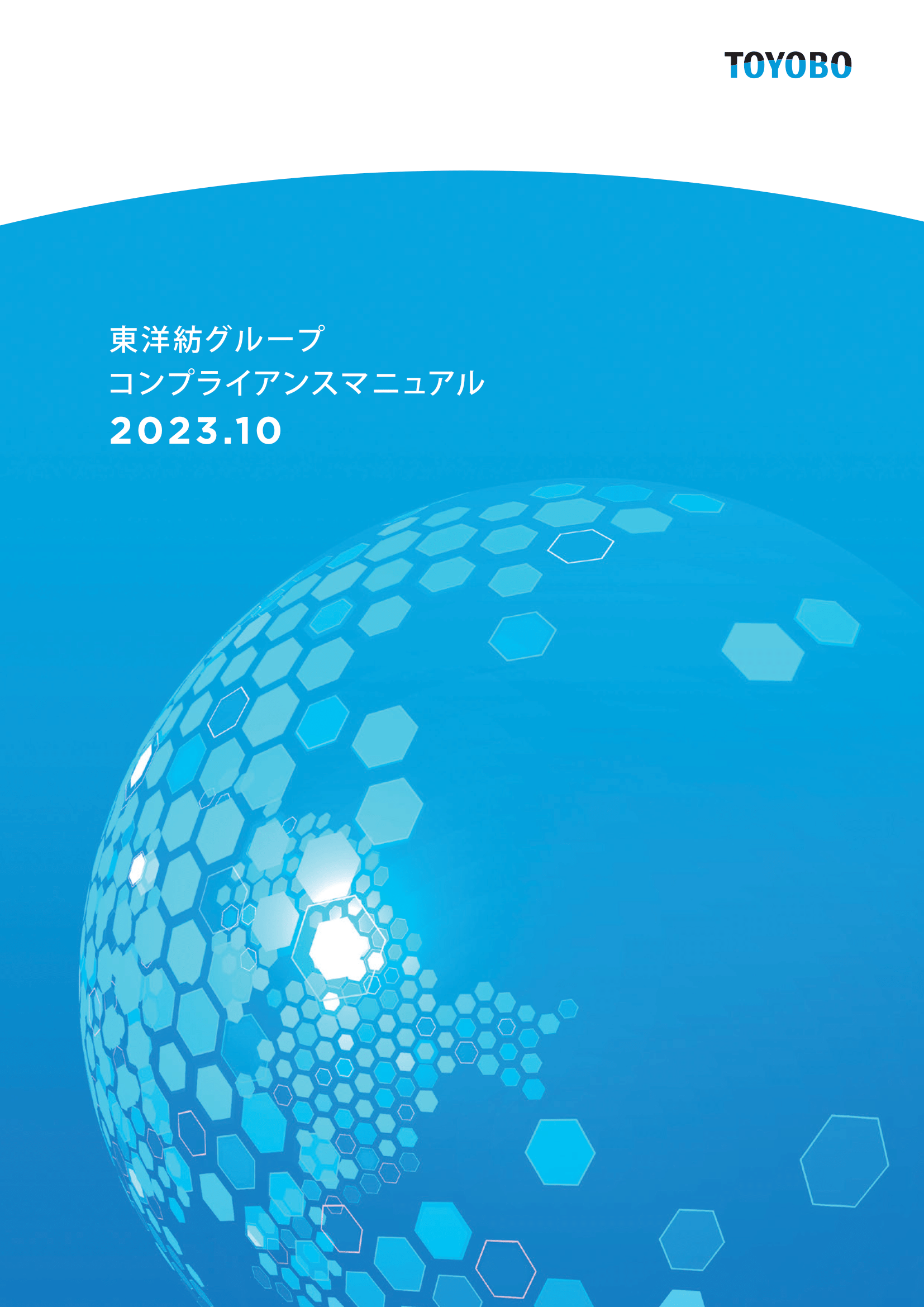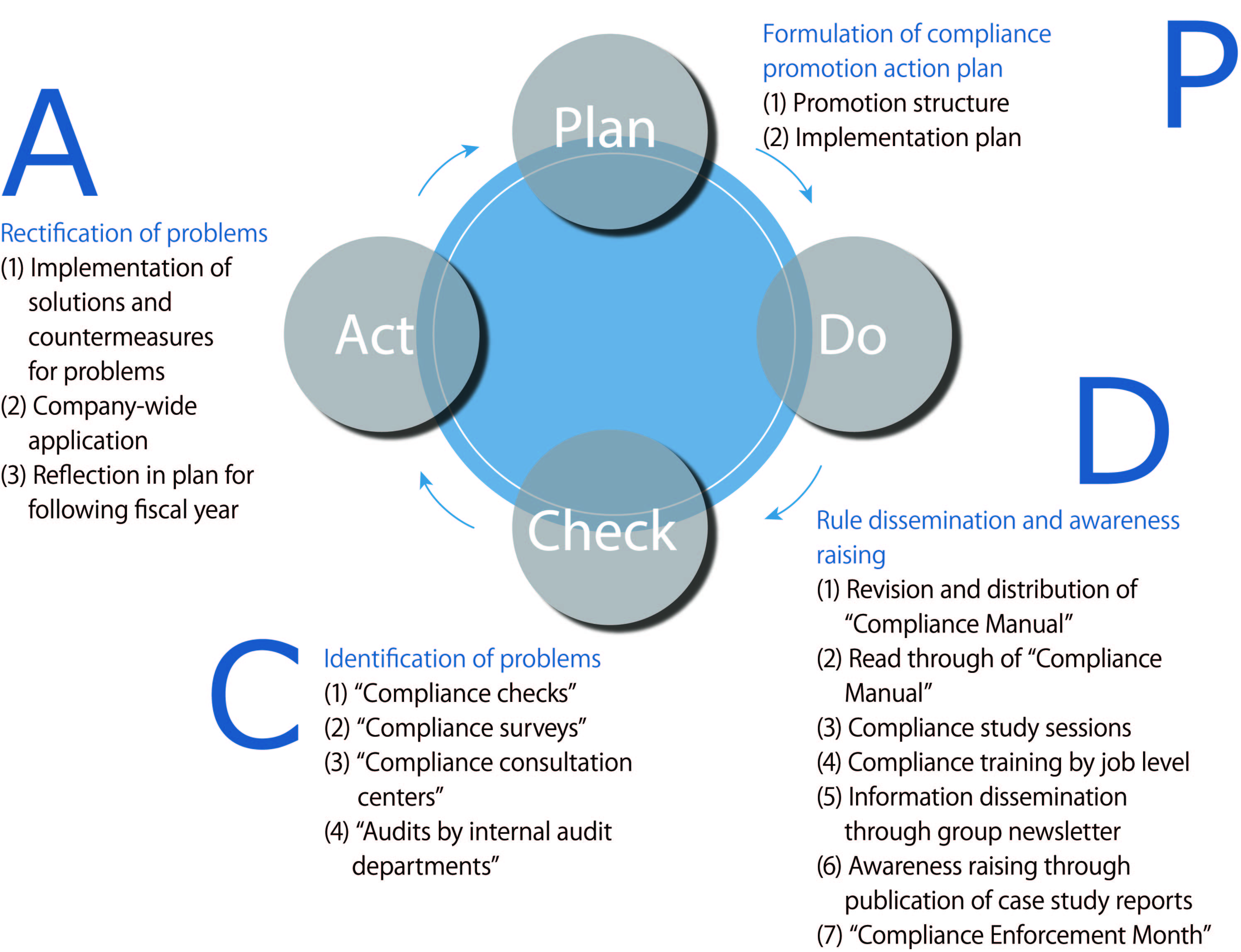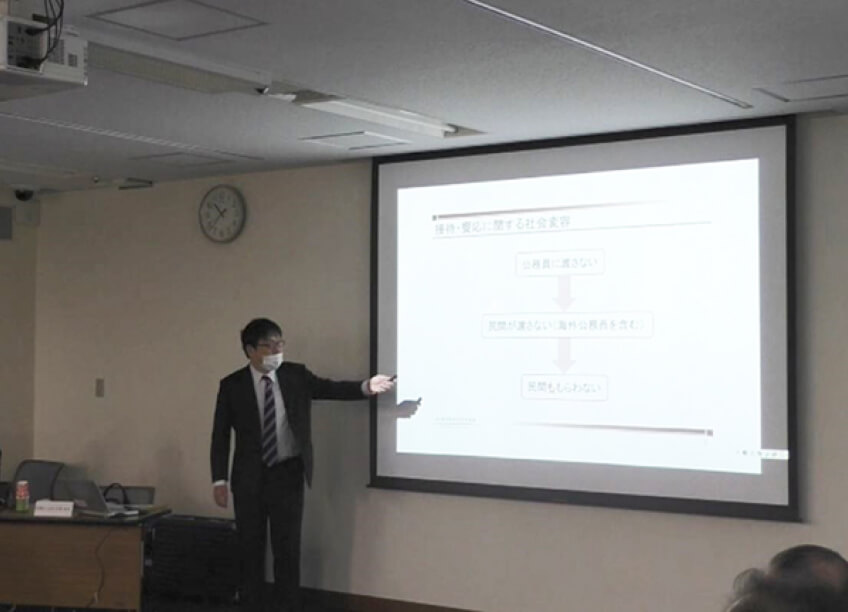Compliance
- Related ESG :
- S G

Management approach
Policy and approach
Based upon our corporate philosophy of Jun-Ri-Soku-Yu (adhering to reason leads to prosperity), at the core of Toyobo group's compliance activities is the idea of “Do what shoud be done” and “Don't do what shoud not be done.”
Furthermore, based on the fundamental principles stated in the TOYOBO Group Charter of Corporate Behavior, the group has summarized the rules that employees must follow in the TOYOBO Group Compliance Manual in a specific and easy-to-understand manner and works to promote understanding and widespread awareness of the rules among group employees.
TOYOBO Group Compliance Manual / TOYOBO Group Employee Conduct Standards (theme excerpts only)
(22th edition, October 1, 2023)

- Contribution to a sustainable society
- Handling of company secrets
- Handling of personal information
- Engaging in fair transactions
- Appropriate transactions with subcontractors
- Responsible procurement and logistics
- Management of export/import cargo and prevention of undeclared exports and imports
- Rules on security trade control (export management)
- Handling of gifts and entertainment (prevention of bribery)
- Handling of political donations, etc.
- Intellectual property
- Proper accounting
- Conclusion of contracts
- Rules on credit management
- Timely and appropriate information disclosure
- Prohibition of insider trading
- Respect for human rights
- Ensuring quality and safety
- Provision of information on products and services
- Appropriate handling of quality data, etc.
- Rules on research and development activities
- Customer service
- Respect for diversity in the workplace
- Prevention of harassment
- Safety and health
- Appropriate working hours management
- Business activities taking the global environment into consideration
- Promotion of social contribution
- Process safety and disaster prevention
- Crisis management overseas
- Response to anti-social forces, etc.
- Ensuring cybersecurity
- Social rules
Structure
A Board of Management is comprised of members from the Board of Managing Executive Officers and Controlling Supervisors. The goal is to promote group-wide compliance from a management perspective. A Compliance Promotion Committee has also been established as a sub-committee, which considers specific initiatives, and the Legal and Compliance Department promotes compliance throughout the group as a whole.
Compliance promotion cycle

P Formulate of compliance promotion action plan
- Promotion structure
- Implementation plan
D Rule dissemination and awareness raising
- Revision and distribution of the "Compliance Manual"
- Read through of "Compliance Manual"
- Compliance study sessions
- Compliance training by job level
- Information dissemination through Group newsletters
- Awareness raising through publication of case study reports
- "Compliance Enforcement Month"
C Identification of problems
- "Compliance Checks"
- "Compliance Survey"
- "Compliance Consultation centers"
- "Audits by the internal audit departments"
A Rectification of probrems
- Implementation of solutions and countermeasures for problems
- Company-wide application
- Reflection in plan for following fiscal year
Targets and KPIs
Targets
Each and every employee complies with laws, regulations, and rules and acts transparently and appropriately, fostering an ethical corporate environment and culture.
KPIs and results
| Initiatives | Targets | Results (FY2024) |
|---|---|---|
| Increase in awareness of compliance | Improvement in compliance questionnaire responses |
|
| Expansion of compliance study sessions (Managers) and various other trainings |
|
|
| Awareness and use of compliance consultation desks | Improvement in compliance questionnaire responses |
|
| Disclosure of no. of cases handled | 102 cases handled | |
| No. of serious legal violations | 0 violations per year | 0 violations |
Initiatives
In fiscal 2024, the Compliance Committee convened twice, and the Compliance Promotion Committee convened four times. Working with the theme of “acting with integrity,” efforts were made to enhance the effectiveness of preventive measures with education and training.
Compliance consultation desks
Our group has established various compliance consultation desks (internal reporting desks) for all employees. These desks receive reports and requests for consultation regarding legal violations and misconduct, corruption, bribery, embezzlement and other corrupt practices, and violations of competition law such as bid-rigging and cartels, as well as bullying, harassment, and other issues occurring in the workplace. We strive for early detection, correction, and prevention of these issues. To ensure worry-free use of these consultation desks, we guarantee protection of privacy, including the names of people who seek consultations, ensure that there will be no disadvantage for employees who consult or report, and accept anonymous requests for consultation.
We are making efforts to raise awareness of these consultation desks through means including the distribution of stickers with information on the desks’ usage and the publication of a monthly Compliance Mini Study for learning about compliance through case studies.
Topics for consultation
- Legal violations and violations of internal regulations and rules
- Acts that violate the Compliance Manual "Corporate Code of Conduct"
- Workplace harassment
- Consultation on other compliance issues that are difficult to judge, etc.
Types of compliance consultation desks
- Internal consultation desk
- External professional service company consultation desk (corporate ethics hotline)
- External legal counsel desk
- Corporate auditor's consultation desk
In fiscal 2024, there were a total of 102 consultations, 13 of which were made through the external compliance consultation desk. The most frequent breakdown was communication, personal relationships, harassment, followed by labor relations (attendance, treatment, etc.). Depending on the contents of the consultation, we implemented corrective measures, recommended disciplinary action, provided advice to the consulting parties, and answered their questions.
Number of consultations for compliance consultation desks (including internal reporting service)
| FY2020 | FY2021 | FY2022 | FY2023 | FY2024 |
|---|---|---|---|---|
| 35 | 37 | 62 | 78 | 102 |
Details of consultations (FY2024)
| Details of consultations | Incidents |
|---|---|
| Communication, personal relations, harassment | 39 |
| Personnel, labor relations (attendance, treatment, etc.) | 20 |
| Misconduct, violations, and breaches of work rules, etc. | 11 |
| Workplace issues concerning the company as a whole (systems, policies, etc.) | 10 |
| Work attitude | 3 |
| Others | 19 |
| Total | 102 |
Education and awareness-raising activities
Formulation, revision and dissemination of compliance manual
We established the TOYOBO Group Employee Conduct Standards, which outline the rules that all employees of Toyobo group must adhere to, in accordance with the corporate ethics provisions outlined in the TOYOBO Group Charter of Corporate Behavior.
In 2000, we issued the TOYOBO Group Compliance Manual, which provides a clear and understandable explanation of the Employee Conduct Standards, and distributed it to all employees. Subsequently, we have been revising the Manual gradually, creating localized versions tailored to the laws and customs of the countries and regions where our overseas bases operate, in addition to an English version.
We promote awareness of the Employee Conduct Standards and Charter of Corporate Behavior through readings of the Manual at workplaces, among other efforts.
The Manual includes measures to prevent corruption, bribery, and other corrupt practices, bid-rigging, cartels, unfair competition, improper accounting, along with provisions for health and safety and proper management of working hours.
Awareness-raising activities during Compliance Enforcement Month
Every October is designated as Compliance Enforcement Month within Toyobo group. During this time, various initiatives are undertaken collectively throughout the group, including the dissemination of a message from the president, readings of the Compliance Manual, hosting of compliance study sessions, and conducting compliance questionnaires. We also use posters and digital signage to communicate information about the consultation desk for compliance.
Holding compliance study sessions (training)
In fiscal 2024, we held 22 compliance study sessions (training) targeting management-level personnel (general managers, managers, section chiefs, etc.) from all Toyobo business sites including headquarters, branches, production centers, and at affiliate companies. We also held them remotely to make participation easier. With members of the Compliance Department, HR and Labor Department, and IT Department serving as instructors, a total of 1,172 employees participated in these sessions, which covered topics such as general compliance, business and human rights, information security, and legal systems. We have also created a video of the study sessions (training) edited for regular employees, and distributed this to group companies.
Various other trainings
As part of level-specific and occupation-specific training for managers, new employees, sales staff, and personnel being sent on overseas assignments, compliance education is provided. In fiscal 2024, a total of 40 various training sessions were held.
We also implement discussion-type training for managers, focusing on topics that are of particular importance to the company, such as safety, quality, and compliance (e.g., accounting fraud prevention, bullying and harassment prevention).

Seminar on gift giving and entertaining
Issuing case study reports
A “Compliance Mini Study,” which educates employees about cases of violation that may arise in the workplace in a case study format, is issued monthly, and “Compliance Reports” are issued irregularly based on compliance violation cases that occurred within Toyobo group.
Compliance and risk assessment
During Compliance Enforcement Month held each year, we conduct an anonymous questionnaire. This includes a survey on employee awareness of compliance including of ethics, safety, quality, confidential corporate information, harassment, the organizational culture, and use of the consultation desks. Through this, we confirm the status of compliance risks in the workplace.
In fiscal 2024, we received 7,564 responses from employees, with the aggregated and analyzed results of the questionnaire disclosed to all employees. Details on individual problems and issues are shared with related departments in a form that does not identify the respondent—this proves useful in improving the situation and preventing problems.
Anti-corruption initiatives
Our group positions the prevention of corruption, bribery and other corrupt practices, bid-rigging, cartels, unfair competition, and improper accounting, as priority issues in compliance. Regarding bribery in particular, along with policies and regulations we have also set guidelines that detail specific rules covering matters such as judgments and monetary standards when giving gifts and entertainment. We work to make these known through inclusion in the Compliance Manual and explanations given during meetings and training.
To build fair and sound business relationships with partners, we have put in place rules for the receipt of gifts or entertainment. These include a requirement to refuse money or the equivalent, or gifts and entertainment that exceed socially accepted norms, and we have introduced a reporting system for the receipt of gifts and entertainment.
In fiscal 2022, as part of our company-wide risk management activities, we implemented a legal compliance risk assessment. Based on a variety of risk scenarios, we performed assessment in terms of the two axes of the severity of impact and the likelihood of a risk occurring. The results obtained confirmed that the level of corruption risk, including bribery, was relatively low across all Sales and Marketing Divisions.
In fiscal 2024, there were no legal violations, administrative dispositions, employee dismissals, fines, surcharges, or other outcomes related to acts of corruption.
From FY2023 to the end of the first half of FY2025, we conducted a survey of major risks of group companies, including legal compliance risks. As a risk assessment including overseas offices, we conducted dialogue based on possible risk scenarios and confirmed the status of risk response. As a result, it was confirmed that corruption risk remained relatively low.
Supervision by Directors
Every year, we report to the Board of Directors on the status of our corruption prevention initiatives and other compliance activities to enable for effective supervision including oversight from external perspective by outside both directors and corporate auditors.







